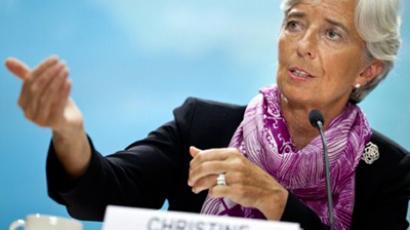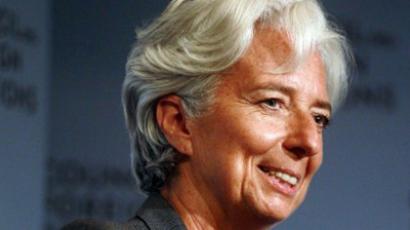IMF head seeks helping hand in Russia
Reforms of the world’s financial system and aid for the Europe's debt-stricken countries are in the spotlight of negotiations between the Russian president and IMF chief. Christine Lagarde is visiting Moscow to see if Russia can come to the rescue.
This two-day stay in Moscow is Lagarde's first official foreign trip outside the European Union.The European public debt crisis along with Russia’s possible help for the bailout fund are said to be the dominate issues on the agenda of negotiations with Russian president Dmitry Medvedev, the finance ministry and the central bank officials.“The IMF is looking to double its fund to around $900 million. And you need to go where the money is. In her sense it is Russia,” RT’s business editor Nick Pool believes. Lagarde’s visit follows last week the G20 talks in Cannes where it was agreed to prop up the International Monetary Fund. And the emerging economies like Russia, China, Brazil, India, and South Africa so-called the BRICS group, are ready to provide their help with the euro, something what the IMF looking for now. And BRICS leaders agreed to offer money to the eurozone, though the crisis does not directly affect the group. The BRICS countries are lobbying for the reform of the IMF in the first place. And above all they are pushing towards redistribution of the IMF membership quotas by January 2014. The sum of the possible bailout for the IMF has not been discussed yet, but Russia has pledged so far the extra funding being negotiated with Lagarde's agency would be limited to $10 billion.However, president Medvedev pointed out clearly that the help should be targeted and transparent, meaning that is should be provided not directly to the European countries, but through international financial institutions such as IMF.Russia, being a member of the IMF since 1992, is one of major shareholders in the IMF. And as it keeps almost 45 per cent of its international reserves in euro, it is interested in helping the eurozone. “It’s in no one’s interest if Europe falls apart. If Europe goes to the dogs, basically everybody does. We are looking at the second dip – double dip – recession. It could be very nasty. Europe is Russia’s biggest customers for oil, gas and all the things it provides. So if Europe goes down, Russia inevitably also sinks with it,” Nick Pool says.Russia paid the last portion of its debt to the international monetary fund back in 2005 and since then it has been contributing to the organization providing money for countries which economies experienced financial problems.After the Moscow visit Lagarde will fly to China and Japan. Asia Times correspondent Pepe Escobar believes the whole idea of negotiations is what the BRICS countries want to achieve in return for landing a helping hand.“Brazil, Russia, India and China especially are to get more voting rights at the IMF,” he told RT. “At the moment the BRICS have like 11 per cent of voting rights. The European Union has 32 per cent – it is completely absurd, it is completely imbalanced. The problem is the Atlanticist elites in Washington and in the large European capitals: they don’t want to dissolve their power inside the IMF. When you have Madam Lagarde going to the BRICS countries with her hat in her hand asking for money, then the whole equation changes, because Russia, China and Brazil especially came, at least imposed their conditions and have voting rights at the level of Director General in the IMF. They can start sweating a policy, but this is going to be a very long, drawn-out battle.” “The only possibility would be a basket of currencies that would include the yuan, the yen, the euro of course, even if it is a battered euro, perhaps the ruble, perhaps the Brazilian real – a real basket of currencies.” he went on. “But there is another development that is, let’s say, an underground development at the moment. Countries to start trading among each other or economic blocs to start trading with each other in their local currencies, bypassing the dollar.”














